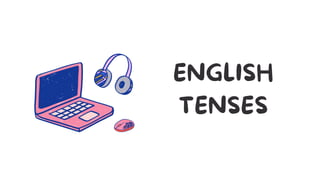
All tenses.pdf
- 2. Present Tenses Present Simple Present Continuous Present Perfect Present Perfect Continuous
- 3. Present Simple VS Present Continuous not finished actions at the time of speaking states repeated actions,facts routines actions Example: I am speaking English now. Example: I speak English every day. I understand you. (not I am understanding you)
- 4. 1. In London most people________at least five languages.(speak) 2. Please keep quiet, I___________to the radio. You know I___________to the news in the mornings.(listen) 3. I never___________ a scarf, but today. I 'm ___________ one because it's unusually cold.(wear). 4. What___________ tonight? Would you like to come and watch the game? (do) 5. Nobody___________they will win the match.(think)
- 5. S+has/have+Ved/third form -past experiences I have been to Barselona,but I have never to Madrid. -recent past actions I have just drunk a cup of coffee. My brother has bought a new car recently. The Present Perfect tense S+has/have+been+Ving Present Perfect Continuous VS -action started in the past and is still happening I have been learning English for 10 years. She has been driving since high school. -action started in the past and has just stopped Why are your hands dirty? II have been writing on the board. You look tired. Have you been working all day?
- 7. What is the difference between these two sentences? a) When I arrived,she left. b)When I arrived,she had left.
- 8. Past Perfect Tence Past Simple Tence S+had+Ved/third form S+Ved/third form VS We use the past perfect to talk about an action which happened before another action or point in the past He passed the test because he had studied a lot the day before. By 2014,they had made six movies. The simple past tense, is used to talk about a completed action in a time before now.
- 9. After Fred (to spend) his holiday in Italy he (to want) to learn Italian. Jill (to phone) Dad at work before she (to leave) for her trip. Susan (to turn on) the radio after she (to wash) the dishes. When she (to arrive) the match already (to start). After the man (to come) home he (to feed) the cat. Before he (to sing) a song he (to play) the guitar. She (to watch) a video after the children (to go) to bed. After Eric (to make) breakfast he (to phone) his friend. I (to be) very tired because I (to study) too much. They (to ride) their bikes before they (to meet) their friends. 1. 2. 3. 4. 5. 6. 7. 8. 9. 10.
- 10. Past Perfect Continuous Past Continuous S+had+been+Ving VS The PPC used to talk about an action that started in the past continued up until another time in the past. He had been watching a video for 15 minutes before the power went out yesterday. To express a long action in the past, it is usually interrupted with a shorter action in the past simple. S+was/were+Ving I was doing my homework when the telephone rang.
- 12. Future Simple S+will+V decisions made at the time of speaking predictions: what we think promises,offers,hopes,requests It is cold. I will close the window. I don`t think he will pass the exam. I promise I will not tell anybody.
- 13. Future Continuous S+will+be+Ving I will be watching TV at 9 pm. She will be cooking when you come. Will you be working tonight?
- 14. Future Perfect Tence Future Perfect Continuous S+will+have+V3/ed S+will+have+been+Ving VS to talk about something that will be completed before a specific time in the future. The guests are coming at 8 p.m. I'll have finished cooking by then. In three years' time, I'll have graduated from university. The FPC is a verb tense that describes actions that will continue up until a point in the future. In November, I will have been working at my company for three years. I will have been learning English for 5 years by the end of the year.
- 15. THANK YOU See you next time!